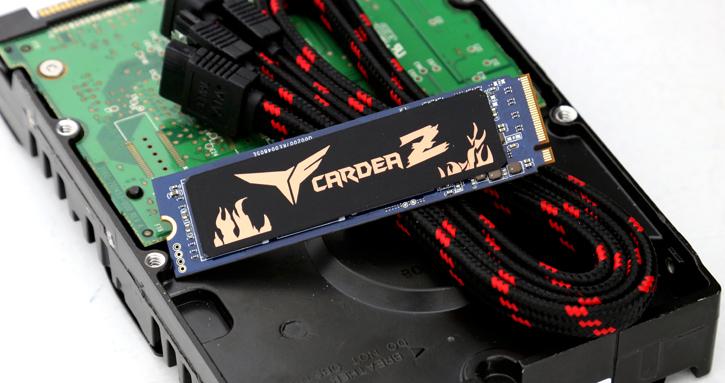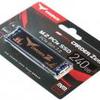Introduction
Team Group CARDEA ZERO M.2. NVMe SSD Tested
Team Group launched a new SSD, the T-Force Cardea Zero. We review the PCIe M.2 SSD. The company targets this drive towards laptops and tablet users and is much thinner than the previously released introduced earlier year. We however find this unit to be pretty darn good, and would recommend it even for an enthusiast class PC.
The SSD is cooled by a mixture of graphene and copper foil. This layer is a total of 0.18mm thick and according to Team Group cause a temperature reduction of about 8%. The Cardea Zero is available in capacities of 240 and 480GB, with respective lifetimes of 335 and 670 terabytes written (TBW). The unit is advertised as (Crystal Disk Mark) resulting into read 2600MB/s and write 1400MB/s for the 240GB model with 2650MB/s and 1450MB/s ratings for the 480GB model. Both read at 180,000 IOPS (4K Random) and write with 140,000 and 150,000 IOPS (4K Random). So yeah, when it comes to random I/O, these puppies should be able to do 180K read IOPS. Random write figures are 140K IOPS for the 240 GB Cardea Zero. and 150K IOPS for the 480 GB drive. At just one-tenth the weight of a traditional 2.5-inch SSD, the M.2 SSDs are ideal for users looking to upgrade their desktop or ultra-thin PCs with high-capacity, high-performance storage. Team Group rates the Cardea Zero at 335TB TBW per 240GB capacity. It has an MTBF of 2 million hours and it is backed by a 3-year limited warranty.
You do need a modern motherboard with capable NVMe supported M.2 (PCI-Expresse Gen 3.0 x4 connected) interface, please do check out your motherboard manufacturer for that. But ever the past year or two all Intel and AMD chipset released in the mainstream to high-end class support it very well. Yeah, have a look at the photo below, and then let's head on-wards into this review.

Team Group T-FORCE CARDEA Zero M.2. with Phison controller and MLC written Toshiba NAND Flash

